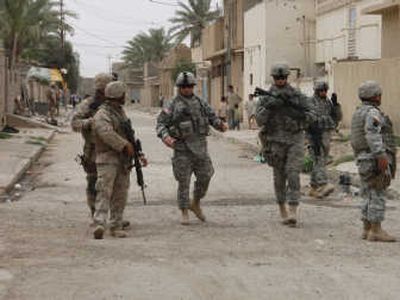Spokane-raised, serving in Iraq

When John Charlton returns to the United States from Iraq, he’s unsure what he’ll do the first time he passes a truck full of gravel.
In Al Anbar province, Iraq, where Army Col. Charlton commands the 1st Brigade Combat Team, such a vehicle has a high possibility of being a suicide truck bomb.
“The terrorists will take a dump truck, put 1,000 to 2,000 pounds of homemade explosives in the bottom, then pile gravel on top,” he said. The resulting explosions can be devastating, but “lately we’ve been successful at keeping them out of the city.”
Charlton, a Spokane native who graduated from Gonzaga Prep in 1978 and Washington State University in 1984, commands about 6,000 soldiers and Marines based in Ramadi, the capital city of the Iraqi province west of Baghdad. The unit is based in Fort Stewart, Ga. and started its third tour of duty in Iraq in January.
A military public information agency made him available for an interview Monday by satellite phone as part of an effort to connect soldiers with their hometown newspapers.
A year ago Al Anbar was considered a stronghold for al-Qaida, which had proclaimed it the Islamic State of Iraq, and nearly written off by military planners. The past seven months have seen a major turnaround, however, with the U.S. military making strong allies of tribal leaders in the area, he said.
“They came to realize that al-Qaida was the real threat, not the United States,” Charlton said. With tribal support, the U.S. has been able to recruit about 8,000 for the police force and 4,000 for the Iraqi military.
“For them, it’s personal. This is their own tribal land,” he added.
Attacks on U.S. troops have dropped from about 30 per day when the combat team arrived to averaging fewer than one a day currently. But troops still must deal with suicide bombers who strap explosives around their bodies or load bombs into vehicles.
With a series of roadblocks and checkpoints, the truck bombs are being kept out of Ramadi, but they can still wreak havoc when they go off in the countryside.
Al-Qaida forces have been pushed to the very southernmost part of the province, or east into other provinces, Charlton said. Still the U.S. troops and their Iraqi counterparts find “tons and tons of munitions every day.”
Last week they received intelligence reports of a possible attack south of Ramadi, and found two large trucks and more than 50 al-Qaida forces, munitions and supplies traveling on a road. About half were strapped with explosives belts and dressed in white, the traditional garb of suicide bombers, he said.
Whether the U.S will be able to reduce its troop levels in Al Anbar in the near future is unknown, Charlton said. The combat team is scheduled to leave Iraq next April.
“We get a lot of packages from home and know people are thinking about us and praying for us,” Charlton said. “We know America stands behind us. The political debate doesn’t have anything to do with us.”